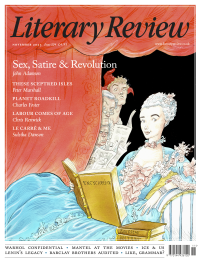Charlie Campbell
Robert Posner
Robert Posner enriched many people’s lives with his charm, intelligence and kindness. He died of cancer on Monday 9 October in a remote cottage on Skye, where he’d moved in 2017. It was an odd place for a man as sociable as Robert to end up, perhaps, but he didn’t need much and made lifelong friends wherever he went. And he had his beloved daughter, Naomi, with him at the end.
Thirty-seven years ago, Robert walked into Literary Review’s office for what would be the first of a number of stints as its business manager. One of the staff had spotted a beautiful man reading the magazine in a nearby cafe and had drawn his attention to the job ad at the back. The editor, Auberon (‘Bron’) Waugh, hired Robert on the spot, so taken was he by his energy and warmth. Robert would be a semi-permanent fixture at the magazine for the next twenty-odd years. His position on the masthead would change regularly, from ‘boxwallah’ to whichever military rank Bron chose to bestow on him that month. Bron had a particular fondness for Robert (which was reciprocated) and seemed to fizz in his presence. But it was not just about charm. If you needed something done, Robert was your man. When I was burgled, Robert turned up hours later with a bag of tools and replaced my broken doorframe. He was what all small businesses need and did everything bar writing, commissioning and reviewing books himself. He also co-founded the Academy Club in Beak Street and ran it, enforcing the club’s only two rules (no poets, no sandals). It became one of Soho’s iconic drinking spots.
Robert was born in northwest London in 1950 and sent to boarding school at a very young age. A schoolmate remembers his buoyancy even then. Robert sat one particular exam in which he was unable to answer any of the questions and wrote instead that he knew ‘nothing about the

Sign Up to our newsletter
Receive free articles, highlights from the archive, news, details of prizes, and much more.@Lit_Review
Follow Literary Review on Twitter
Twitter Feed
It wasn’t until 1825 that Pepys’s diary became available for the first time. How it was eventually decrypted and published is a story of subterfuge and duplicity.
Kate Loveman tells the tale.
Kate Loveman - Publishing Pepys
Kate Loveman: Publishing Pepys
literaryreview.co.uk
Arthur Christopher Benson was a pillar of the Edwardian establishment. He was supremely well connected. As his newly published diaries reveal, he was also riotously indiscreet.
Piers Brendon compares Benson’s journals to others from the 20th century.
Piers Brendon - Land of Dopes & Tories
Piers Brendon: Land of Dopes & Tories - The Benson Diaries: Selections from the Diary of Arthur Christopher Benson by Eamon Duffy & Ronald Hyam (edd)
literaryreview.co.uk
Of the siblings Gwen and Augustus John, it is Augustus who has commanded most attention from collectors and connoisseurs.
Was he really the finer artist, asks Tanya Harrod, or is it time Gwen emerged from her brother’s shadow?
Tanya Harrod - Cut from the Same Canvas
Tanya Harrod: Cut from the Same Canvas - Artists, Siblings, Visionaries: The Lives and Loves of Gwen and Augustus John by Judith Mackrell
literaryreview.co.uk